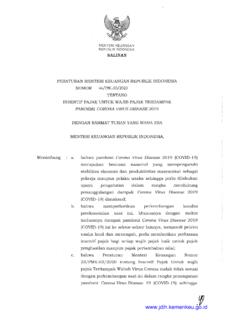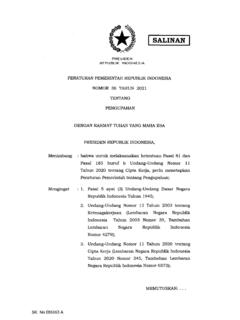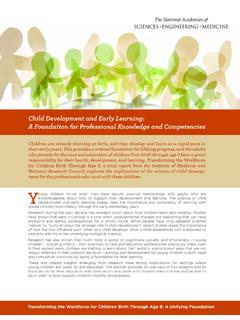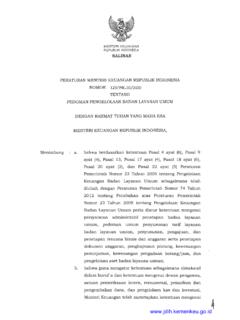Transcription of The Illusion of Control - Nuovo e Utile
1 Journal oj Personality and Social Psychology1975, Vol. 32, No. 2, 311-328 The Illusion of ControlEllen J. LangerYale UniversityA series of studies was conducted to elucidate a phenomenon here referred toas the " Illusion of Control ." An Illusion of Control was denned as an ex-pectancy of a personal success probability inappropriately higher than the ob-jective probability would warrant. It was predicted that factors from skill situa-tions (competition, choice, familiarity, involvement) introduced into chancesituations cause individuals to feel inappropriately confident. In Study 1 sub-jects cut cards against either a confident or a nervous competitor; in Study 2lottery participants were or were not given a choice of ticket; in Study 3 lotteryparticipants were or were not given a choice of either familiar or unfamiliarlottery tickets; in Study 4, in a novel chance game, subjects either had or didnot have practice and responded either themselves or by proxy; in Study 5lottery participants at a racetrack were asked their confidence at different times.
2 Finally, in Study 6 lottery participants either received a single three-digit ticketor one digit on each of 3 days. Indicators of confidence in all six studies sup-ported the most people will agree that there ismuch overlap between skill and luck, a fullunderstanding of how inextricably bound thetwo are has yet to be attained. In principlethe distinction seems clear. In skill situationsthere is a causal link between behavior andoutcome. Thus, success in skill tasks is con-trollable. Luck, on the other hand, is a fortui-tous happening. Success in luck or chanceactivities is apparently uncontrollable.
3 Theissue of present concern is whether or notthis distinction is generally recognized. Theposition taken here is that it is not. Whilepeople may pay lip service to the concept ofchance, they behave as though chance eventsare subject to Control . If this is correct, itis of interest to determine the variablesresponsible for this number of different lines of researchprovide support for the position that peopleThis article is based on a doctoral dissertationsubmitted to the Department of Psychology, YaleUniversity. The author would like to offer specialthanks to her thesis advisor, Robert Abelson, andto Carol Dweck.
4 She is also grateful to the membersof her committee, Judith Rodin, William Kessen,Irvin Child, and Dickon Repucci; and to thosewho helped in conducting the research, Jerry Fields,Carol Marcus, Jane Roth, and Richard for reprints should be sent to Ellen , Graduate Center, City University of NewYork, 33 West 42nd Street, New York City, NewYork a skill orientation in chance situa-tions. Studies concerned with the judgment ofcontingency, the "just world hypothesis," orthe attribution of responsibility for an out-come all demonstrate either that people denythe operation of chance or when they doappeal to chance as an explanation for anevent, this appeal is not simply a function ofan objective lack of contingency.
5 A brieflook at some of this literature helps to clarifythis several laboratory studies, investigatorshave shown that adults often perceive causalrelationships in the absence of and Jenkins (1965) asked three groupsof subjects to judge, from a set of facts pre-sented in one of three ways, the amount ofcontrol exerted by cloud seeding over rain-fall. The information "seed" or "no seed"followed by "rain" or "no rain" was presentedserially to one group of subjects, in an orga-nized numerical summary to a second group,and serially followed by an organized sum-mary to the third group.
6 Although the event,cloud seeding, was chosen in order to suggestthe operation of chance, the only group thatsuccessfully judged the lack of contingencywas the second group, which received the in-formation only in the summary form. Whenthe information was presented over time, asis usually the case in real life, subjects judgedcontingency when there was none. One might311312 ELLEN J. LANGER argue that the reported inference of contin-gency was a response to the demand charac-teristics in the situation rather than a truereflection of what subjects actually , in a conceptually similar studyon psychodiagnosis, Chapman and Chapman(1967) also found that subjects expecting tosee a relationship overlooked discontinuingevidence even when offered a $20 prize forbeing and other researchers ( , Bruner& Revusky, 1961; Golding & Rorer, 1971;Smedslund, 1963; Starr & Katkin, 1969.)
7 Hamilton & Gifford, Note 1) have providedclear evidence that there are many situationsin which people fail to accurately judge thelack of contingency. An interesting variantof this occurs in what has been called the"just world" belief in a just world is a belief thatactions and outcomes must have the samevalence. That is, good things happen topeople who do good things, and bad thingshappen to people who do bad things. Thebelief that everyone gets what he deservesdenies the operation of chance. It eliminatesthe necessity for concern and worry over thepossibility that aversive events may occur bychance at any time.
8 Events become predict-able and thus, by being anticipated, are one of the first of these studies testingthe just world hypothesis, Lerner (196Sb)asked subjects to evaluate two workers, oneof whom was fortuitously rewarded. In orderto make sense of this chance event, subjectsperceived the worker who was rewarded asmore capable. In a study by Lerner andSimmons (1966), subjects witnessed a peerapparently receive severe shocks for makingminor errors in a learning task. They foundthat subjects reject and devalue a sufferingvictim to make the negative consequencesseem deserved when they are unable to alterthe victim's fate.
9 Landy and Aronson(1969), Lerner and Mathews (1967), Rubinand Peplau (1973), Shaw and Skolnick(1971), Simmons and Piliavin (1972), andWalster (1966) have also found support forthe just world hypothesis. One expects goodpeople to do good things, and one expectsgood things to happen to good people. As Lee(1971) said of a poker player in a discussionof luck, "If our hero did not win our estima-tion of him would decrease even though ob-jectively we have to realize that getting fourkings had nothing to do with any of hisqualities" (p. 66).Whether or not an event will be perceivedas determined by skill or chance may dependon factors relatively independent of the actualcontingency.
10 Cohen (1964); Feather (1969);Kelley (1967); Langer and Roth (in press);Streufert and Streufert (1969); Weiner,Frieze, Kukla, Reed, Rest, and Rosenbaum(1971); and Wortman, Costanzo, and Witt(1973), for example, have all discussed thetendency for people to attribute desirableoutcomes to internal factors but -to blameexternal factors such as luck for failures. Thevalence of the outcome would not be a potentfactor if people distinguished between chanceand skill on the basis of the observational support for the asser-tion that people treat chance events as con-trollable comes from sociologists Goffman(1967) and Henslin (1967).







